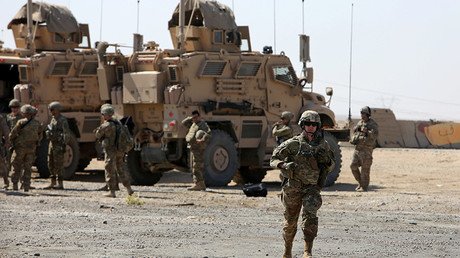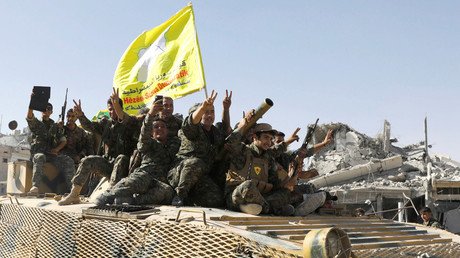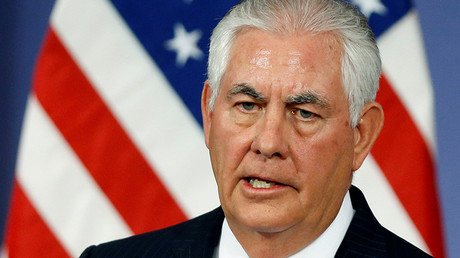Challenge for US in Syria is bending Russia to its will – Senate hearing

US troops will remain in Syria indefinitely in order to counter Iranian influence, a senior State Department official told the Senate. He acknowledged the success of this strategy depends on Russia seeing things the American way.
President Donald Trump “has committed as a matter of strategy that we will not leave Syria,” David Satterfield, acting assistant secretary of state and head of the Bureau of Near Eastern Affairs, told the Senate Foreign Relations Committee on Thursday. The US strategy also includes “stabilizing” the territories in the north and northeast held by the US-allied Syrian Democratic Forces (SDF) and developing political structures there “into a model for the rest of Syria.”
The US is “not working and will not work with or through the Assad regime. Until there is a credible political process that can lead to a government chosen by the Syrian people—without Assad at its helm—the United States and our allies will withhold reconstruction assistance to regime-held areas,” Satterfield said in his prepared remarks, indicating the Trump administration has not fundamentally diverged from its predecessor’s understanding of the Syrian situation, focused on ‘regime change’ in Damascus.
Multiple senators from both sides of the aisle noted that this is a tall order without Russia coming around and abandoning its support for the Syrian government.
Moscow’s focus has been on “stabilization … putting an end to the chaos and violence” in Syria, Satterfield said. “The question is at what price, over the long term.”
“We hope Russia’s long-term strategic calculus will see Iran poses a threat to their interests,” Satterfield said, adding that a greater Iranian role in the Middle East “cannot serve any regional or trans-regional security interest.”
Russia wants a victory in Syria that is “clean and nicely wrapped,” Satterfield said, and the US diplomats are trying to persuade Moscow that the best course would be to follow the US and “international community” in implementing the UN Security Council resolution 2254.
Asked what kind of persuasion the US is using, Satterfield brought up US military power in the region and access to reconstruction funds for Syria, something he said Russia, Iran and the government in Damascus lack.
#Russia knows who staged attacks on Syrian base & it’s not Turkey – #Putinhttps://t.co/jwpMOVEEswpic.twitter.com/K7weqq7WYM
— RT (@RT_com) January 11, 2018
After Senator Marco Rubio (R-Florida) complained about Russia’s growing influence in the Middle East, Satterfield explained that the US is still the biggest player in the region.
“We lead, we shape, we direct the like-minded community … some dozens of countries which hold in their hands the resources to rebuild Syria,” he said, while the US military “protects the Emirates, Qatar, Saudi Arabia and the Gulf” from the threat of Iran.
When Rubio interjected that Russia presents it differently, Satterfield brushed it off.
“They play a weak hand very well, but it is a weak hand,” he said. “At the end of the day, we’re the party looked to for fundamental defense, fundamental support, not Moscow.”
Concerns over Iranian presence in Syria took up much of the hearing, with Satterfield explaining that the November 8, 2017 memo signed by Russia and the US in Jordan specifically requested the withdrawal of “non-Syrian foreign forces, including Iranian and Iranian proxy forces, such as Hezbollah” from ceasefire zones.
The requirement is “meant not only to test Russia, but also to diminish the influence of Iran and its proxies in Syria and protect the borders of our allies, Israel and Jordan,” the diplomat explained.
Senator Bob Menendez (D-New Jersey) noted that Russians are also a “foreign force” in Syria. Satterfield said the US is working to remove them through a “combination of measures,” including sanctions. Russia has a defense treaty with Damascus and its forces in Syria are there at the invitation of the government.
For the first time, several other senators joined Tim Kaine (D-Virginia) in questioning the legal authority for the US presence in Syria, which was not sanctioned by the UN or the Syrian government. Fighting Islamic State (IS, formerly ISIS/ISIL) could be shoehorned into the 2001 congressional authorization to fight terrorism, but what happens when IS is defeated? Satterfield said the terrorist group will remain a danger indefinitely, and the only way to make sure it doesn’t return is political change in Syria.
US lets militants train, mount attacks from its Syrian bases – chief of Russian General Staff https://t.co/IMwJla9amapic.twitter.com/J3anP6tAXp
— RT (@RT_com) December 27, 2017
The State Department official sought to downplay Turkish fears of the US working with the Syrian Kurds, saying the political structures being established in the US-controlled part of Syria are “multiethnic, not Kurdish in an ethnonationalist sense.” The Kurds and Arabs gathered around the SDF are “a big swath of population, of assets - both hydrocarbon and agricultural - and they need to be part of a future of Syria,” Satterfield said.
Notably, Representatives of the Pentagon were absent from the hearing, citing the need to inform the House and Senate armed forces committees of their activities first.
















